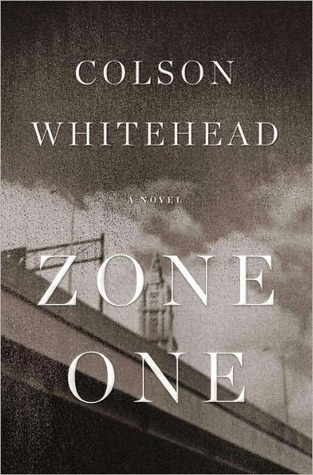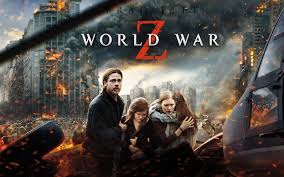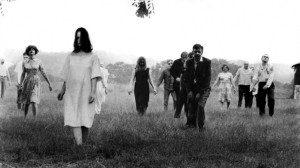How do you turn a zombie story into literary fiction? Make it really boring. At least, that’s Colson Whitehead’s solution in Zone One, and it has a certain, simple brilliance to it, as well as a comic flair. All the zombie-standard beats are there — the gross-out cannibal gore, the sudden bloody shocks, the piles of dead, the foolish hopes bloodily dismembered — but all slowed down and anesthetized with self-consciously arty lit fic prose and meandering stream-of-consciousness flash backs and flash backs within flash backs. What if Henry James had been a pulp writer? the book asks, and then proceeds to spend gobs and gobs of paragraphs on a split second zombie attack, the teeth reaching for the throat with the leisurely upper-crust nonchalance of a Bostonian meaningfully twitching his well-groomed facial hair. Apocalypse takes on the breakneck rhythms of afternoon tea.
I am a fan of horror films and I love Henry James, and watching the two thunked together is pretty enjoyable…for a while. At some point, though, you start to feel that the contrast between style and substance is more a gimmick than a necessity; a mash-up that never quite transcends its initial, “wouldn’t it be funny if..?” joke. Henry James’ novels are slow and byzantine because he sees the world as slow and byzantine; his characters long for and drown in artifice. The best zombie horror is a vision of humans as shambling meat monsters, comic, horrible, visible to the bone. Whitehead tries to merge the two…but they end up undermining each other. The horror in James’ world (like “The Beast in the Jungle”) is that nothing happens, a nothing that is seriously undermined when you’ve got gouts of blood gouting, even if only in slow motion. Similarly, if visceral viscera is what you want, detours into lit-fic’s grab bag of ironized nostaligia (here is a memory of parents having oral sex; here is a memory of a family restaurant) doesn’t take you there. The two modes don’t build on one another or clash in inventive ways; they just take the edge off each other. Instead of one thing or another, you’re left with a mediocre middle.
You could argue that that’s thematic I suppose; mediocrity is an important theme in the novel. The main character — only known by the nickname Mark Spitz — is defined as a kind of avatar of average; he mystical power of mundanity allowed him to slide through school without either failure or excellence, attaining B’s whether he studied or not, and then going on to nondescript jobs calling for his ideal lack of talent. His averageness stood him in good stead in the apocalypse as well.
He was a mediocre man. He had led a medicore life exceptional only in the magnitude of its unexceptionality. Now the world was mediocre, rendering him perfect. He asked himself: How can I die? I was always like this. Now I am more me.
It’s a cute conceit — though, maybe again a bit too cute. Why exactly are we supposed to see a zombie apocalypse as a triumph of the mediocre, again? Maybe if these zombies were all, every one, the stragglers — infected people who just stand and stare vacantly, pursuing some sort of former moment in their lives — flying a kite, flipping a burger. But the hungry skels, or skeletons, aren’t mediocre; they’re ravening and awful and nightmarish and maybe ridiculous, but not bland unless you toss an awful lot of lit fic tropes at them, and even then not enough. Nor is the skill set of the surviving humans especially mediocre; at least, a talent for killing and surviving seems like it’s still a kind of excellence. Mark Spitz says he’s mediocre, but Whitehead doesn’t sell it. Instead, Spitz doesn’t seem so much average as especially talented at adaptation; he’s good at fitting in. He’s not a master of mediocrity, but of assimilation — as you’d expect, perhaps, from a black man named Mark Spitz.
Spitz’s blackness barely registers through the book; his race is only explicitly revealed towards the end, when he makes a kind of joke about his name and the fact that black people supposedly aren’t able to swim. The reticence here seems especially significant since the modern zombie iteration began with a black protagonist in Night of the Living Dead. Romero’s film plays with the divide between black and white and human and monster; the zombies become in many ways a ravening white horde, while, at the end of the film, the law and order forces cleaning up the dead casually shoot the good guy because they think he’s a zombie, and/or because he’s black. Romero’s apocalypse is bleak/funny/horrible (like Octavia Butler’s) in part because the end of the world actually doesn’t change anything; divisions of gender, of race, of class, still persist. Even at the end of everything, old hates continue to matter. Zombies don’t change us because zombies are us; even in death, people suck.
Whitehead, though, explicitly rejects that vision. For him, and for Mark Spitz, the zombie apocalypse is a new era. Everyone you meet in the book, of whatever class, seems to be pulling together, fighting the good fight; some are incompetent, some are weak, but to the extent that there’s stupid cruelty or violence of humans against humans, it’s all off to the side and bracketed as a kind of inevitable effect of trauma, not to be dwelt on or looked at closely. Even that old staple, lust, barely puts in an appearance. Instead,
There was a single Us now, reviling a single Them. Would the old bigotries be reborn as well, when they cleared out this Zone, and the next,and so on, and they were packed together again tight and suffocating on top of each other?
Spitz goes on to think that yes, old prejudices would be revived if civilization were to get up and running again. But (spoiler!) the whole point of the end of the book is that civilization is not revived; every human effort to return to normality is doomed to failure. The dead take back everything, and in their number “Every race, color, and creed was represented.” The world is not going back to normal, and as long as it doesn’t, equality wins.
Glen Duncan, in a New York Timesreview that is deftly lobotomized by its own condescension, seems to be under the impression that the zombie genre has no literary merit, and that Whitehead’s contribution is to bring the virtues of thematic depth to an otherwise crap pulp form. I’d argue, though, that Whitehead’s evasion of suspense and serious-writer-prose serve to obscure a poignant, but still unsatisfying glibness. Romero’s zombie stories trap you in the binary between self and other; you’re always trying to not be the monster and not being the monster makes you the monster, “the monster” here being, not just zombies, but blacks, whites, men, women — all the familiar, bleak faultlines of identity. Zone One, on the other hand, seems to be a zombie story for Obama’s post-racial America — a dream that at the end of all things, at least, at last, non-white folks will slip into the sea of the dead on equal terms. Henry James and George Romero both, I think, have a bleaker vision, in which, even after the apocalypse, the teeth of caste are not so easy to unlock.



